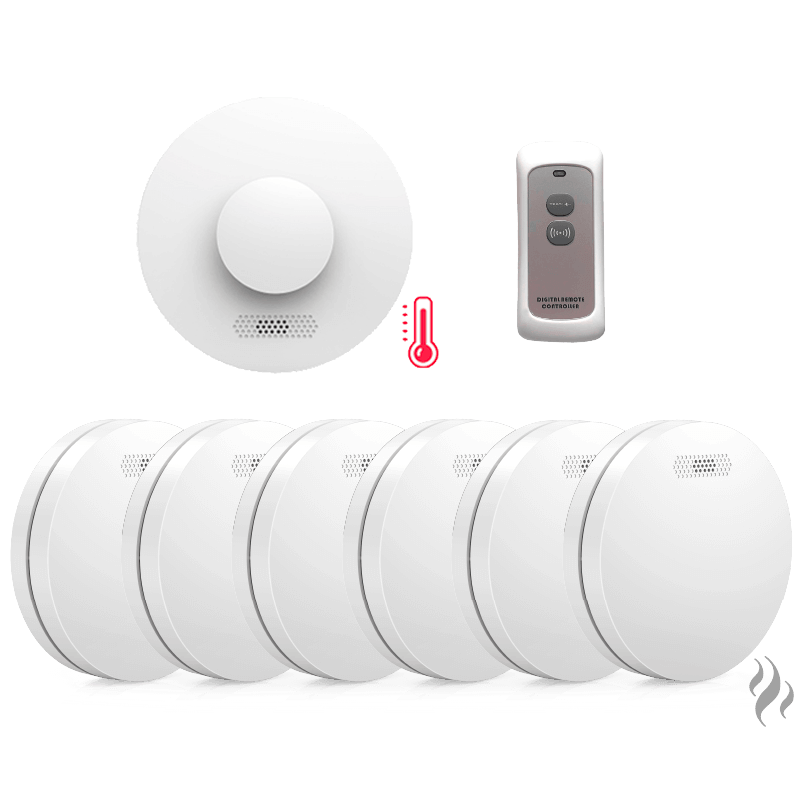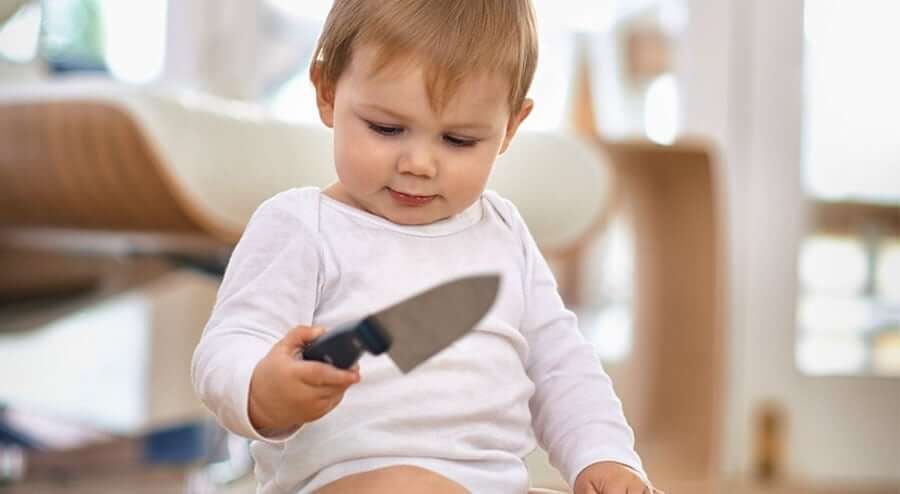
What Are The Most Dangerous Hazards For Your Family?
Home safety is a very important topic and should be taken into consideration. When we think of home safety, the first thing that comes to mind are fires. But there are many other ways you can stay safe at home, such as avoiding cooking with open flames or not leaving children unattended when using heaters. This article will help you to understand each of these possible home safety hazards in more detail so that you can prevent accidents from happening.
Falling Hazards at Home
Falls are the leading cause of injury-related death among older adults in the United Kingdom. Researchers estimate that falls account for more than one million emergency room visits each year and 25% of all hospital admissions.
The most common factor associated with severe falls is "tripping or slipping on an uneven or cluttered surface." Other commonly reported factors include unfamiliarity with a specific environment, impaired vision (e.g., poor lighting), and dizziness/loss of balance. Falls may be caused by environmental conditions (e.g., external elements) as well as individual characteristics (e.g., physical health, cognitive ability). For example, someone might trip and fall because the carpet isn't secured to the floor; or they might be unable to avoid a fall because of poor eyesight.

Whether you are the caregiver for an elderly loved one, a care-receiver yourself, or just someone who tends to have trouble with balance while walking around your home—there are several measures you can take to reduce your risk of falling and injuring yourself:
Maintain Effective Lighting
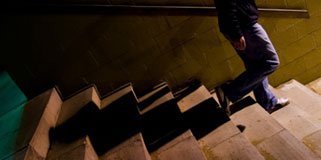
Bright lighting will help you see obstacles that could be hazardous if stepped on (e.g., loose toys under the coffee table, a pile of books next to the kitchen counter). Keep in mind that reflection from hard surfaces such as windows will decrease brightness, so make sure lamps are placed strategically about your living space.
Keep Surfaces Clean & Clear
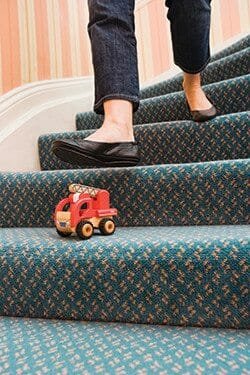
Removing clutter will help you maintain a sense of balance and equilibrium as you walk around your home. Put away anything that might cause you to trip or slip (e.g., shoes left outside the door, small toys in the middle of the floor), and always wear socks with nonslip rubber soles.
Pack Away Loose Appliances
Secure large appliances (e.g., TV stand) to wall studs using appropriate fasteners. This will prevent them from falling if someone bumps into them while walking by; it could also save your life to have loose objects secured when there is an earthquake (see below).
Use Damp-Proofing Materials
Make sure any tile floors are set over concrete slabs with a sufficient depth of the damp-proof course. Damp-proof courses need to be at least 150mm thick, and the slab should ideally be laid on a deep bed of sand.
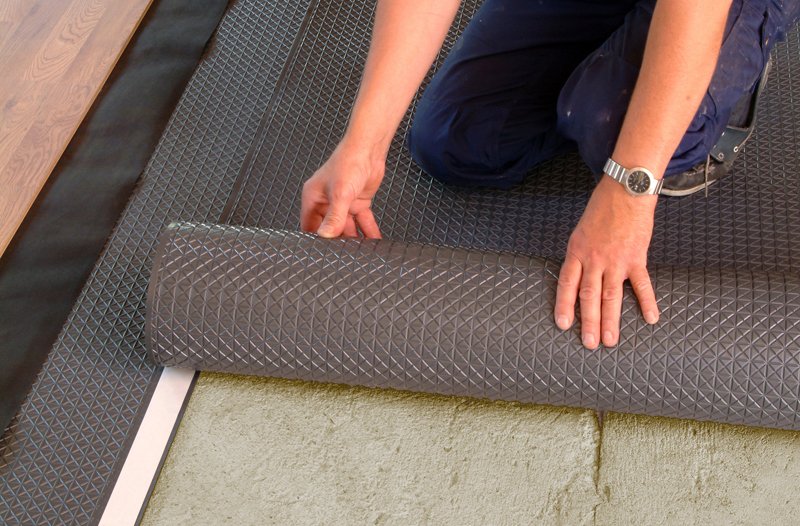
Avoid Stepping onto Sloping Surfaces
This includes inclines/ramps made from some composite decking materials. These tend to have slippery surfaces that may cause you to lose your balance or fall backwards. A safer bet is to use gravel paths, wet concrete, or gravel-filled pallets between stepping stones in garden beds.
Remove Loose Carpet Tacks When Vacuuming
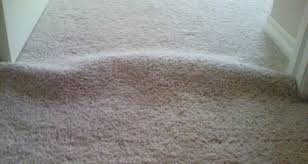
If the carpet isn't secured at the edges (or doesn't have carpets), you may step on one of these tacks when walking through the room. Pay close attention when vacuuming because these tacks can hide in hard-to-reach areas and they are relatively small.
Do Not Use Elastic Straps to Fasten Loose Carpets
If you tend to trip over your carpet, it might be tempting to keep it from moving around by using an elastic cord or strap underneath. Don't do it! This could put some serious pressure on your ankle muscles, and you might even break a bone if you step in the wrong place.
How To Prevent Falls At Home
In conclusion, the most dangerous hazards in your home are unfamiliarity with a specific environment, impaired vision (e.g., poor lighting), and dizziness/loss of balance. Falls may be caused by environmental conditions (e.g., external elements) as well as individual characteristics (e.g., physical health, cognitive ability).
You can reduce your risk of falling and injuring yourself by maintaining effective lighting, keeping surfaces clean and clear, packing away loose appliances, using damp-proofing materials on tiles or wood flooring, avoiding stepping onto sloping surfaces, removing loose carpet tacks when vacuuming, and not using elastic keepers/straps to fasten carpets.
If you have just moved into a new home and you're worried about all the hazards that might be lurking in the shadows, the last thing you want is to trip over an electrical cord or fall down the stairs when walking up from your basement. Whatever your safety concerns may be, there are some steps you can take right away to improve your chances of avoiding injuries around your home.
Poisoning Hazards At Home
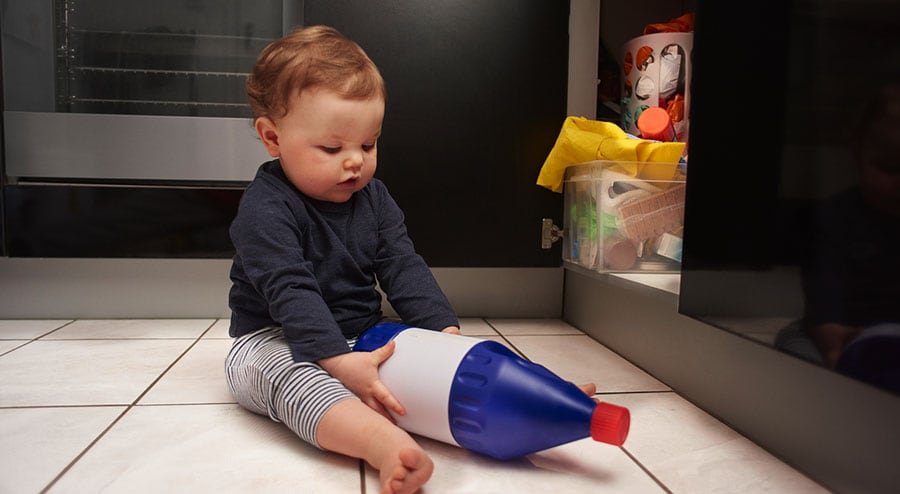
The second leading cause of fatalities is poisoning (e.g., accidental ingestion of contaminated food and beverage, cosmetics, etc.). There is a wide range of products used in the home that can cause poisoning if ingested by children or pets (oral/ingestion exposure).
The most dangerous domestic products include cleaning supplies, pesticides, herbicides, and other gardening chemicals; hair relaxers, dyes, and bleaches; skin medications such as ointments/lotions; household cleaners and disinfectants; toilet cleaners; oven cleaners; air fresheners; fabric softeners/dryer sheets. Let's see how to prevent hazards and keep your family safe.
Keep All Hazardous Substances Out Of The Reach Of Children And Pets
If you have children and pets in the house, make sure you keep all these products out of their reach. If you store cleaning supplies and other hazardous substances in the same place, keep everything neatly organized so that your child or pet won't be able to confuse them with food or water (children are particularly attracted by bright colours).
If you have an aquarium at home, fish tanks contain a wide variety of chemicals that could potentially poison children if ingested – take every precaution to prevent toddlers from playing with these devices.
Cookie jars should always be kept on high shelves because kids love sweets; even properly placed medication can be easily mistaken for candy; it's best to keep bathroom cabinets locked when not in use and clear them of any objects/products you don't need anymore.
Avoid Accidental Ingestion Of food And Beverage
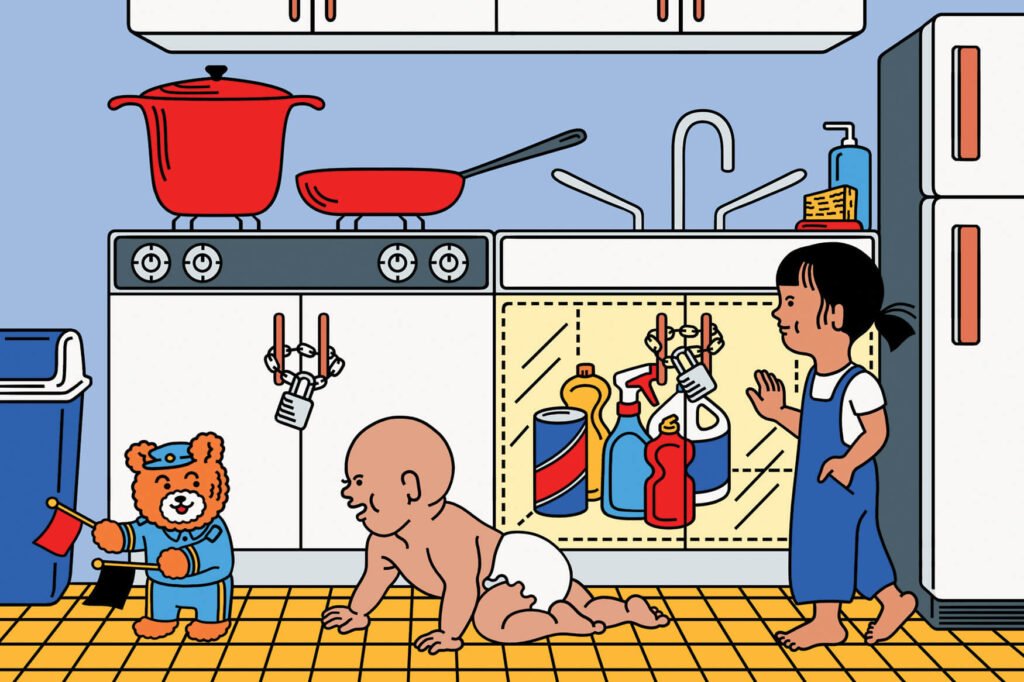
It's always better to keep your food out of sight or use child-safe fasteners. Keep all medications in a safe place by locking them away when not in use; clean up countertops and floors to reduce the possibility that your toddler may eat something off the floor.
Make sure you don't refill household cleaning products like bleach, ammonia, or other harsh chemicals with water because this could produce toxic vapours; never mix cleaners as this can lead to dangerous reactions (mixing ammonia with chlorine bleach is an especially bad idea). Use personal protective equipment – gloves, goggles, etc. if handling hazardous substances like pesticides/herbicides; it's best to work with someone else so you can each keep an eye on your children and reduce potential risk.
Label All Hazardous And Toxic Containers
Label any hazardous or toxic substances and products with proper warnings to prevent accidental ingestion. Keep all potentially dangerous products away from children because there is nothing that can stop them once they go on a trip to the bathroom. Do not forget about your pets-animals have a real penchant for sweet things; if you don't want your pet to eat something, cover it properly.
Make sure you are fully aware of what's in every hazardous substance and product that you purchase at the store so you will know how to handle it safely; always read labels carefully before using any product. Follow manufacturers' directions/warnings for proper use and disposal of hazardous material.
Demonstrate Acceptable Behaviour When Using Hazardous Materials
Use gloves, goggles, etc. while handling or working with pesticides/herbicides (follow label warnings). When handling chemicals like ammonia, bleach, etc., keep the windows open and wear a mask, goggles, or glasses at all times.
If anyone in your household is planning on using some hazardous substance, make sure you are well-informed about how to handle it safely; always follow label directions/warnings for proper use and disposal of hazardous material. Don't forget about pets – they can become seriously ill from even small amounts of toxic substances. Enforce firmly rules forbidding children from playing with any cleaning/laundry supplies like cotton swabs, sponges, or pads soaked in chemicals because they could present serious.
Teach Your Children Not To Play With Objects They Do Not Know.
Children should be taught early on that these products are not toys and should never be played with; even ordinary household cleaning products can cause serious injury to children if they are not handled properly. Even though they are attractive, too much attention should never be given to poisonous plants in the garden as kids will always want to pick them and eat them. Your child needs to know that there are various precautions you need to take when it comes up against chemical substances – wear protective clothing/equipment, read all instructions carefully, follow safety guidelines, etc.
Carbon Monoxide Poisoning Hazards at Home
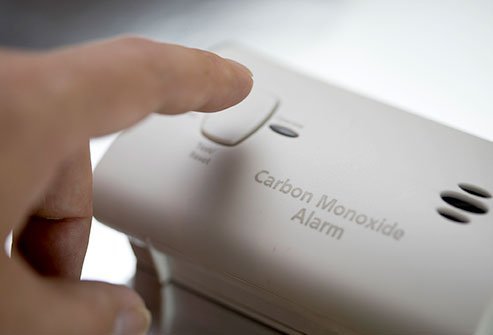
Carbon monoxide (CO) is a colourless, odourless gas that can lead to death within minutes if inhaled. Common sources of CO poisoning are gas stoves and heaters, some portable generators, and cars running in garages attached to homes.
Fortunately, the most simple way to stay protected from carbon monoxide is to adopt carbon monoxide detectors in places where carbon fuelled appliances represent safety hazards for you and your family.
Make Sure Your Home Is Fitted With Carbon Monoxide Detectors
Carbon monoxide detectors are the best way to prevent carbon monoxide poisoning. Every home should have one carbon monoxide alarm in each area where carbon fuelled applianced are located.
For instance, gas stoves in the kitchen, fireplaces in the living room, gas boiler in the attic, can all lead to potential safety hazards of carbon monoxide leaks. For this reason, each of these areas must be fitted with functional fire alarms such as carbon monoxide detectors.
Of course, these devices are not foolproof as they only sound when there is too much carbon monoxide in the air around us, but not before that point, so you wouldn't hear them if a leak were small or occurred without warning.
If your detector sounds for any reason: get out of your home immediately; call 999 from a neighbours' phone even if it's only going off for a few seconds; once you are moved away from your home don't go back inside until officials have determined where the leak came from and what made it happen.
Never Heat A Home With An Oven or Gas Hobs

Avoid heating your home with oven and gas hobs to avoid CO poisoning; this is especially relevant to people who live in rented houses or flats as they are less likely to have fitted with gas detectors than owners of their own houses.
Even when gas ovens and hobs are fitted with automatic shut-off devices it's safer to heat your home using other methods of heating (e.g., electric heaters). If you are unsure whether your home is fitted with proper fire alarms, contact your landlord or check our article on what are the required fire alarms to keep you, your children, and your family safe in the United Kingdom.
Gas-powered Equipment Indoors
Gas-powered equipment must never be used indoors in the United Kingdom. This includes portable generators, gas-powered hedge trimmers, and lawnmowers – for this reason, it's highly recommended to use electric blowers rather than petrol-powered ones as the latter can get quite dangerous when operated inside a house.
It's worth mentioning that these devices are also prohibited from being used outdoors during windy weather conditions or if there is a danger of carbon monoxide leaking indoors (e.g. if you're going to do some cleaning around your home). Avoid using gas-powered products outdoors unless necessary.
Never Use Internal Doors or Windows For Ventilation
It is important that how you try to get fresh air into your house does not compromise its security; locked doors and windows, securely fastened vents etc. should be used as only a last resort. For example, if you want cooler/moist air from outside to come in through open windows; you could angle those windows properly (usually on opposite sides of an interior room) so that they allow air to come in without letting any intruders sneak through them too. If you don't know how to set up your windows in this way, call an interior designer or heating expert.
Is Your Home Fitted With Carbon Monoxide Alarms?

In today's world, it's difficult to know what the most dangerous hazards are in your home. But thankfully, there are carbon monoxide detectors that can help protect you and your family from potential safety risks. Carbon monoxide is a colourless, odourless gas emitted by burning gasoline, natural gas, oil, propane, or wood.
It can leak out of some appliances like gas stoves and fireplaces. To help prevent carbon monoxide poisoning in the house, make sure that your home is fitted with a functional carbon monoxide detector in each place where carbon fuelled appliances are located (i.e., kitchens where gas-powered stoves exist).
If it sounds for any reason: get out of your home immediately; call 999 from a neighbours' phone even if it's only going off for a few seconds; once you are moved away from your home don't go back inside until officials have determined where the leak came from and what made it happen. Not sure if your place meets home safety standards? Check out our guide on what is required to make your house a safe place.
Fire Hazards at Hone
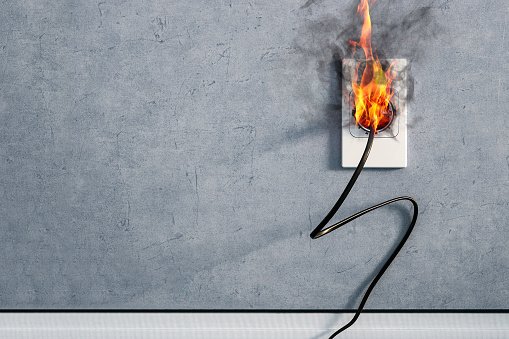
One of the most common household hazards is represented by fire hazards. Fire can be both an imminent and serious danger, especially if you live with young children or elderly people in your house.
Every day we go about our days without considering its danger. It is a possibility that all of us have in our minds but don't want to think about. It's not just the house that can be ablaze, it can be anything from clothes to cars - and can happen at any moment. There are many ways you can prevent this from happening. Let's find how.
Install Fire Detectors and Smoke Alarms
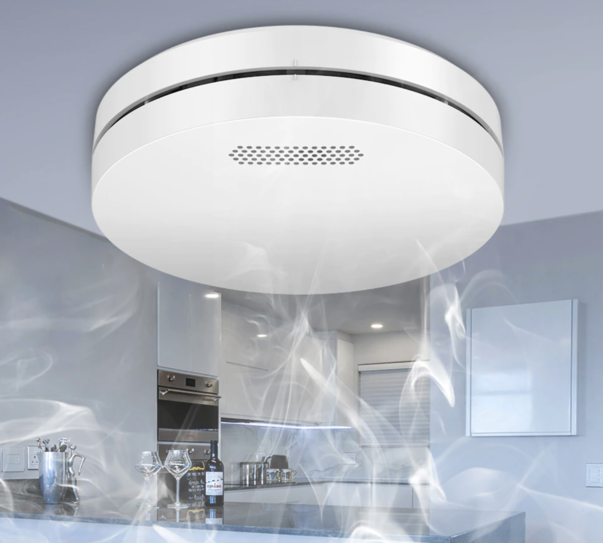
The most important thing to do is to install appropriate fire detectors and smoke alarms to be alerted at the first sign of fire. It's important to make sure that you install them in areas where lots of activities take place; for example, in the kitchen, around the water heater and boilers, and in the living room. If you already have fire alarms installed, it is good practice to check them regularly, to make sure that they are in working condition. Click here to find out the difference between smoke and heat alarms and what you should use in your house.
Not sure what are the right detectors for your home? Take a look at our complete guide on fire and smoke alarms by clicking here. The fire alarms are relatively cheap and provide full protection to your home. Prevention is very important, act now!
Don't Leave Cooking And Heating Unattended.
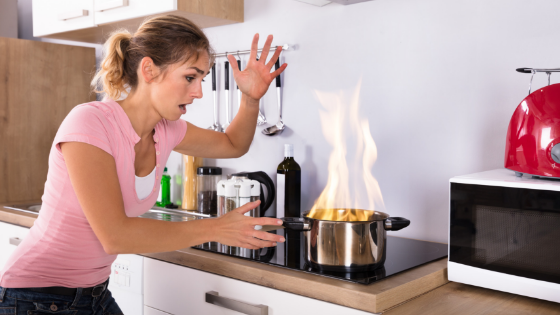
This is a very common practice, especially when we come home after work and don't have time to cook. It's quite tempting to just leave the stove or electric heaters on and go do something else until it's time to turn off. However, this can be potentially lethal - so never forget that you are in charge of your fire hazards. Take the time to stop everything before you leave it.
Keep Children Away From Dangerous Sources of Fire
As we have already mentioned, fire is a danger, especially around young children. It's easy to forget that they are small and curious by nature, which might lead them to play with matches or candles.
A good habit is to make sure that you place all your household fire hazards in a safe box so that you can keep kids away from them. Keep matches, lighters, and cigarettes in a separate place where you can supervise your kids. Make sure that electric heaters are not accessible to children - they can be melted and used as toys for kids or just play with them while being unaware of its high temperature.
You should also ensure that all the other products such as liquids, paper, or fabrics are placed and sealed in a box that will be hard for your kids to open.
Learn How To Use a Fire Extinguisher

This might sound a bit extreme, but it is good to have one in case of a fire outbreak. This could save lots of lives and prevent the spread of the fire. However, you should know how to use extinguishers before they can come in handy when something is going on. If you feel confident enough about your safety knowledge, go ahead and get one. Otherwise, be sure to place your extinguishers in a safe place where you can easily spot them and grab them as soon as there is a danger of a fire outbreak.
Be aware that water is not always the best solution to deal with the fire - make sure you know what kind of chemicals are used on extinguisher types before you act.
Be sure to have a clear escape plan in case there is a fire outbreak. Everyone should know where to stand and what to do and where to go when there's the danger of a fire outbreak and they are aware of the situation. Make it clear that you will never stay inside a burning house if there are young children or elderly people involved.
Prevention Is Essential
The safety of your home and family is a top priority. The fire hazards described above should be taken seriously, as they can lead to devastating fires that will destroy all belongings or even loss of life. Every household needs to have an emergency plan at their disposal so that if anything happens, you'll know what to do with young children and where the safest exit routes are located.
Remember: prevention is key; make sure to take precautions while cooking or heating food by using proper protection like open flames extinguishers or electric heaters turned off when not needed. Lastly, never leave any child unattended around any potential fire hazard - whether it be candles on the dinner table or matches stored near flammable items.
Drowning Hazard At Home
Drowning isn't a risk for young children only when swimming or playing outdoors, but also with unattended buckets of water and when having a bath or shower. Around a third of all fatal home, accidents occur in places like the bathroom, kitchen, or basement - and over half of these happen when someone is left to their own devices for too long.
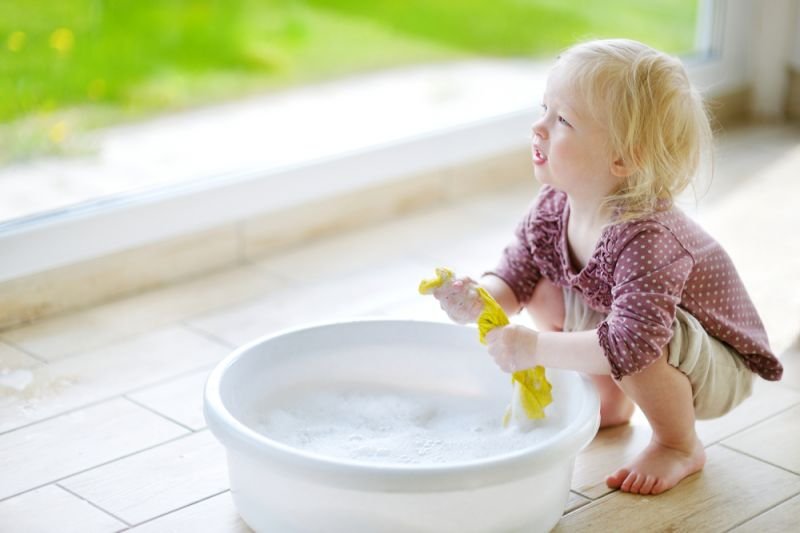
Approximately 300 children die from drowning-related incidents every year; most often these are children under five years old who have been left alone in the bath or by a pool. Here are some safety tips on how to avoid this and guarantee your young family members' safety.
Put Water Buckets Away
Buckets full of water are a common cause of accidental drowning: it has happened before those small children playing with them slipped and fell into the buckets, sliding underneath them to escape. So if you still have buckets around your home, never leave any child unattended near them and make sure they're always kept away from the place
Attend to Bathing Children
If you have young children, bathing can be a nightmare - as washing hair requires some concentration and is tiring for toddlers. But it's better to take the time to help them wash their head than to let them play on their own in the bathtub: if they slip under the water, no chance of keeping themselves afloat will save them.
Do not leave a child alone in the bathtub under any circumstances: if you show confidence in their swimming abilities, they'll be eager to prove themselves and will probably jump into the tub even without your supervision; this is why it's best for an adult to supervise children at all times when bathing - but be sure to never leave them unattended!
Choking
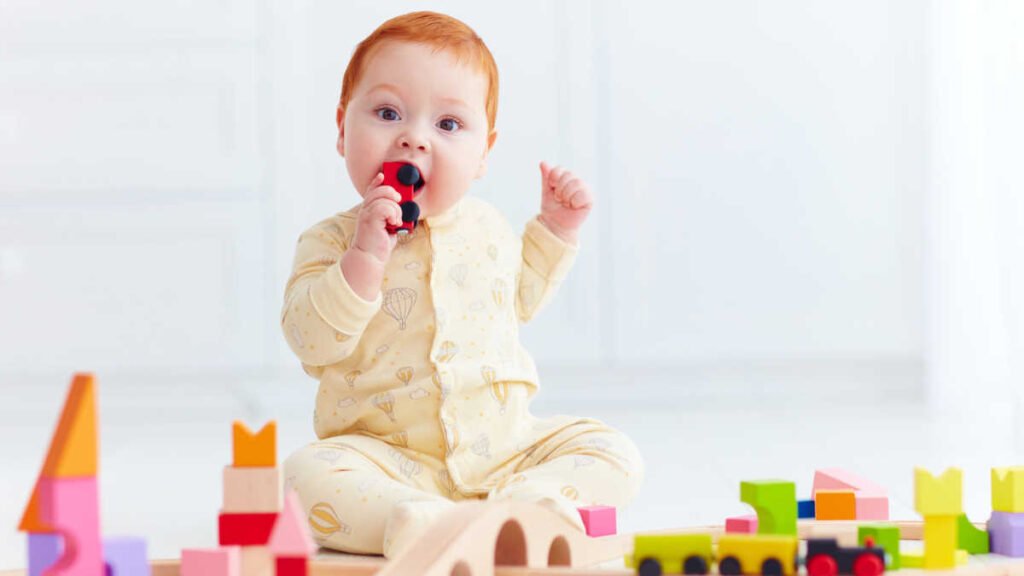
Every year, thousands of children die from food choking-related incidents: it's easy for a toddler to choke on a small toy or piece of food. Because they can't communicate their troubles, you need to be always watching and ready to help them should anything happen. Here are some tips for house safety you should follow to avoid choking hazards.
Inspect Toys Before Giving Them To Your Child
Small toys and decorations make great gifts for young children, but if they're too small they can easily become stuck in a toddler's mouth. Pay close attention to potential hazards like small buttons ornaments and little pieces of plastic which might fall off. If anything looks even remotely dangerous, don't buy it; or if you already have it in your home, don't let your child play with it.
Supervise Them When They're Eating
Not every child eats by themselves from the very beginning: some kids eat sitting on their parent's lap or standing up near them while being fed pieces of food one after another. Sometimes this can be hard to control, and a piece of food can become stuck in their mouth, representing a very high choking hazard. It's best not to let children who are being fed this way stand or walk: they might slip on some pieces of food and choke even more easily.
Sharp Object Around The House

Sharp objects are everywhere - and it's easy to forget them when you're cleaning the house. It only takes one second for a toddler to notice an object of interest and try to play with it: in these situations, don't take your eyes off of them. If the object is too small or sharp, remove it from the child's reach immediately. Here are some safety measures you must follow.
Clean Up Any Loose Objects Around The House
You must always keep your house tidy to prevent any accidents. A lot of people don't want to clean up where they live because it's tedious but there is a way around it.
Start by organising everything that needs cleaning; this includes having boxes for stuff that's too old or broken to ever use again. Put everything into the respective boxes and leave them out until they're all filled with items that need to be thrown away.
Spend one day every week on the task of throwing away what the boxes contain and putting them back in their place so you know where they are when you need them next. This will take some time at first, but it won't be such a hassle anymore once you've done this for a while.
Put Away Scissors And Knives
Scissors are a common household item. Many people use them to cut paper, fabric, or other materials for crafts and hobbies. A lot of these people don't know that scissors can also be dangerous to children if they're left out.
Scissors can hurt children in two different ways: one way is when the child tries to hold the scissors and cuts themselves on the blades, and the other way is when the child runs into someone with an open pair of scissors. This causes cuts on their face and head area which are very dangerous because they could cause severe bleeding.
Knives are also a common household item but they're much more dangerous than scissors: it only takes one slip and these knives could cause a fatal injury in a short amount of time. To prevent these kinds of injuries, put them in drawers where the children can't reach them or stow them away somewhere else when they're not being used.
Close Cabinet Lids
Cabinet lids are also a potential hazard: if your child opens one and sees some sharp objects inside, they might try to grab them and hurt themselves in the process. In these situations it's best not to let kids get into drawers unsupervised; even at this age, you should start teaching them not to touch things they can't see.
Electrical Hazards at Home
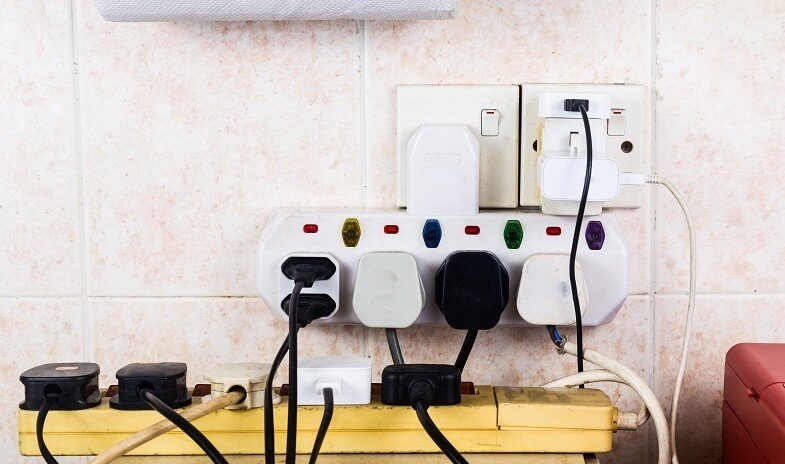
One of the most dangerous hazards in a household is an electrical hazard. This kind of hazard can be found in anything that can produce electricity and send it through wires or cables. They are usually found in machines such as ovens, refrigerators, TVs, and microwaves. Let's explore some of these common safety hazards.
Electrical Wiring in The House
Electrical wiring is probably the most dangerous electrical hazard in a household. Even though they are used to keep our houses running, this kind of wiring can be very dangerous and lead to accidents with no warning.
When these cables break or get cut, electricity can still travel through them. This means that if you touch an area where there's an electrical wire, you'll get a strong shock. To prevent these injuries, you should make sure that all of the electrical cables in your house are well insulated.
Another important thing to do is to inspect the wires once a month and make sure nothing's wrong with them. If you do this, then an accident will be less likely to occur because you'll have checked for damages before they could hurt you.
If you have any doubts about how safe the wires in your home are, contact a local electrician to see if they're in perfect working conditions. If not, you should have them replaced as soon as possible. Discover how to reduce excessive wiring at home using wireless interlinked smoke alarms.
Electrical Outlets And Extension Cords
Electrical outlets are an important part of the electrical system in our homes because they allow us to plug in things such as lamps, TVs, fans, and other electric appliances. There is a serious hazard associated with these though: children can get to them if they're not locked away, and once a child gets inside of one, it could cause serious injury.
The same goes for extension cords: if you leave these laying around the house then your children might think that they're toys. When they grab on to one and get shocked, this can be a dangerous situation where you'll have to figure out how to respond.
Appliances That Use Electricity
This kind of electrical appliance contains a heating element or a motor which is used to power some device. It's one of the most dangerous hazards in the household because it can cause injuries if you're not careful enough while using them. The electricity and heat they produce can burn you, or make your clothing catch fire when left unattended.
These kinds of appliances include ovens, hairdryers, curling irons, heaters, and other things that you can set a temperature level on. Since they are so dangerous it's best not to leave them unattended when in use.
Protecting Your Children From Electrical Hazards at Home

If you want to make your home safer for your children, then you should consider getting some safety devices that will prevent them from coming in contact with any kind of electrical potentials. One of the best ways to do this is by installing safety plugs, which are designed to keep small objects such as toys and hair out of an outlet.
You can also opt to get power outlets that shut off automatically when an object such as a knife or a fork gets stuck in them. Since these kinds of outlets can cost a pretty penny, they might be out of your budget; however, it is something to consider if you have little ones at home.
Preventing Fires With Circuit Breakers or Fuses
One of the main reasons that electrical fires occur is because something either burns out on an appliance, or there are too many appliances running at once. Fuses and circuit breakers can help prevent this from happening by cutting off the power to whatever outlet they're connected to whenever a problem occurs.
Circuit breakers are usually found in older homes, but now they're being installed in new houses as well. The main purpose of them is to reduce the number of fires that occur due to electrical problems.
Fuses are a little bit different from circuit breakers because they will only cut off the power when the circuit is overloaded by too many appliances running at once. They don't usually last forever, but they are cheaper than circuit breakers and can prevent fires from occurring.
Making Sure The Outlet Is In Working Order Before Plugging In Appliances
One of the main reasons electrical injuries occur is because people don't make sure an outlet is working properly before plugging in a new appliance. If you have problems with outlets in your home, it might be time to contact an electrician and have them inspected.
Ensure that if you're using a surge protector to plug in new appliances, the surge protector is plugged into a working outlet. If the one you are using isn't working properly then you should replace it before plugging any more appliances into it.
Final Advice
Every home is a place where people can relax and feel at ease. However, many hazards can make life difficult for a family or individual who lives in it. These hazards can even lead to death if they aren't dealt with perfectly. With this being said, everyone must be aware of these dangers and learn what to do to prevent them from occurring. If you don't know where to start from to protect your home, check out our range of fire and smoke alarms that will provide you a first essential layer of safety at home

